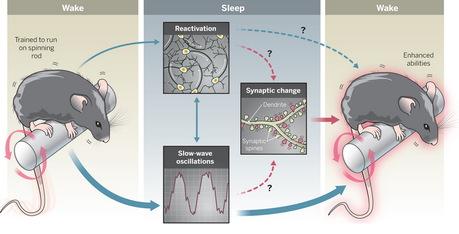Euston and Steenland do a perspective on nice work by Yang et al. that probes the role of sleep in altering mouse brain structures. I pass on their summary figure (click to enlarge) and some context comments.:

Figure Legend. Three phenomena that occur during sleep have been linked to memory enhancement—slow-wave oscillations in brain electrical activity, reactivation of recent experiences, and changes in synaptic connectivity but the strength of the evidence (indicated by arrow thickness) varies. As shown in red, Yang et al. link both reactivation and slow-wave sleep to changes in synaptic connectivity that enhance learning.
To address whether synaptic strength increases or decreases during sleep, Yang et al. used a powerful technique to visualize dendritic spines in the motor cortex of live mice. The mice were genetically engineered to express a fluorescent protein in a subset of cortical cells. A small window was created in the skull, allowing microscopic imaging of dendritic spines repeatedly over the course of hours or even days. This technique was previously used to show that training mice to stay atop a rotating rod—an acquired skill—induced the formation of new dendritic spines in the motor cortex. Further, the rate of new spine formation was correlated with the degree of task improvement. These findings provided direct evidence that synaptic change in the mammalian cortex underlies learning. Yang et al. extend these findings, showing that learning-induced spine changes are segregated on specific dendritic branches. After learning, when two branches on the same dendritic arbor were examined, one typically showed many more new spines than the other. If mice were subsequently trained on a different skill (i.e., running backward on the spinning rod), the new spines induced by the second task grew selectively on the previously underproductive branch. Hence, different skills seem to be localized on different dendritic branches.
To test the role of sleep in spine formation, Yang et al. repeated their experiment with and without an 8-hour period of sleep deprivation immediately after training. Sleep deprivation markedly decreased the number of new spines. This effect also was branch-specific in that sleep deprivation reduced spine formation primarily on the dendritic branch with the higher number of new spines. Importantly, sleep had no effect on the rate of spine elimination. The authors also observed that sleep made newly formed spines much more likely to still be present 1 day later, consistent with the idea that consolidated memories are less sensitive to decay. In other words, sleep gives spines staying power.

